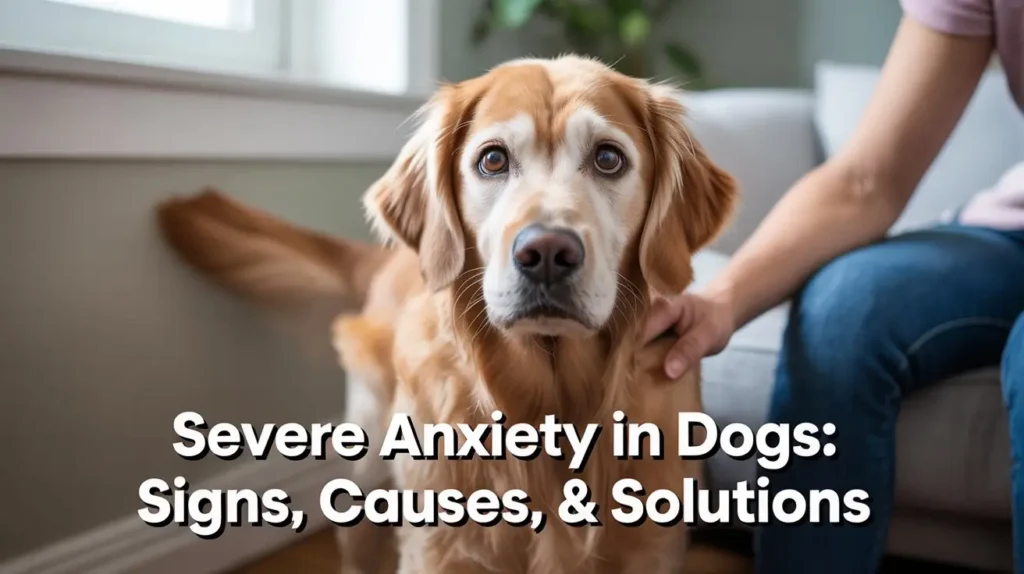The problem of Severe Anxiety in Dogs continues to increase its prevalence in animal families. Anxious behavior in dogs will display through their regular activities. Being aware of anxiety symptoms in dogs enables you to start addressing the issue early. Adult dogs need professional treatment of severe anxiety conditions for optimal health benefit.
What is Severe Anxiety in Dogs?
Severe Anxiety in Dogs, a dog suffers dog anxiety because it experiences continuous fear or stress. The anxiety trigger occurs because of environmental modifications and loud noise disturbances or solitary circumstances. This type of anxiety exists as one of the prevalent anxieties among dogs. The relationship between dogs and being apart from each other usually ends poorly.
The development of anxiety begins when dogs reach early maturity. The natural development of puppies leads many of them to face anxiety during separation from their parents. The condition will become a more critical anxiety problem in dogs if veterinary intervention does not occur.
Severe Anxiety in Dogs Symptoms

The initial step to help a dog with anxiety requires accurate identification of its symptoms. Look for:
- Excessive barking or whining
- Destructive chewing or digging
- Pacing or restlessness
- Indoor accidents despite house training
- Attempts to escape
When your dog displays such behaviors it may indicate they suffer from anxiety. Note all variations especially in dogs that normally remain peaceful.
Severe Anxiety in Dogs, Most signs that dogs show originate from the condition of separation anxiety. People tend to complicate the emotional connection dogs establish with their humans when they spend time apart. The sensitivity level of particular dog breeds correlates with their susceptibility to develop severe anxiety symptoms.
Causes of Severe Anxiety in Dogs
- Various factors lead to anxiety in dogs.
- Being left alone (separation anxiety)
- Past trauma or shelter history
- Sudden environmental changes
- Loud events like storms or fireworks
- Lack of socialization
Severe Anxiety in Dogs, most puppies experience the onset of anxiety because of separation from their owners. The condition usually develops when dogs lose their mother during weaning and after adoption. In dogs an absent initial support system leads to developing serious anxiety problems.
Managing Separation Anxiety

Start with routines. Dogs feel safe with structure. Maintain consistent walking schedule together with stable feeding times.
The first step to manage separation anxiety in dogs involves leaving them unattended for brief amounts of time. Slowly increase your time away. Positive consequences should be given to dogs as they maintain their composure.
Provision of anxiety dog toys exists as a tool for dog owners to manage separation distress. The toys serve to soothe dogs and simultaneously maintain their focus. The trio of chew toys and food puzzles together with scent-based toys offers the most successful approach.
Also, consider anxiety therapy. Stress reduction for dogs comes from sprays that provide calmness and wraps that apply pressure with herbal supplements as a source of relief. A visit to your vet becomes necessary when dealing with severe cases of anxiety in dogs.
Therapy and Emotional Support
Certain dogs automatically develop anxiety-related behaviors as their nature. Severe Anxiety in Dogs therapy dogs exhibit resilience through calming behavior and embrace their owners emotionally and detect their emotional state. Such dogs possess necessary traits to provide emotional support during anxiety situations.
Missionary training of these dogs is not necessary for you. Look into certified programs. Trained service dogs for anxiety treatment provide assistance for panic attacks as well as supporting someone who experiences daily anxiety or PTSD.
Before making a purchasing decision check the reputation of the anxiety service dog for sale. Involve yourself with thorough evaluation of both certification documents and client feedback before making any purchase choice. The proper training applied to dogs enables them to profoundly transform lives.
Professional Support and Treatments
Toys along with routines help only some cases of anxiety. Sometimes, you’ll need professional help. Look for a vet behaviorist. The service creates a customized approach for each dog individually.
Dogs suffering from intense anxiety conditions might benefit from prescribed medication. It’s often combined with training. There is a double benefit to behavior therapy because it increases confidence alongside fear reduction.
Anxious dogs need help right away so do not delay treatment. Early help makes recovery easier. The failure to treat dog anxiety symptoms will develop into persistent issues.
Helpful Tools for Severe Anxiety in Dogs

Several anxiety treatment tools exist for dogs and include the following:
- Soothing music playlists
- Weighted dog vests
- Calming treats
- Diffusers with dog-friendly pheromones
- Interactive anxiety dog toys for separation
Along with each tool, your dog will receive relaxed feelings throughout stressful incidents including separation anxiety episodes.
The Approaches to Care for Anxious Canines
Service dog training programs do not result in every dog obtaining certification to become an anxiety support animal. Dog companionship is achievable for numerous dogs despite initial predictions. Such dogs deliver comfort most notably to people suffering from depression or stress.
These anxiety-support dogs require equivalent attention as well as continuous care from their humans. The bond is mutual. Maintenance and training enable dogs to develop fully.
The appropriate solution for anxiety needs can be found by obtaining emotional support dogs for anxiety. Service dogs demonstrate extraordinary loyalty with their ability to respond immediately and present extraordinary love to the people they serve.
It is vital before certification to assess the temperament of your dog. Ensure that you possess the required readiness to assume this commitment.
Severe Anxiety in Dogs can seem scary. The right measures will allow you to assist effectively. Dogs might exhibit anxiety symptoms so monitor their behavior before your action needs to be taken. Create a safe space. Stick to routines. Invest in anxiety dog toys to treat both separation anxiety and anxiety symptoms in dogs.
Consult professional help for significant anxiety issues
You should consult professional help for significant anxiety issues. The resources for anxiety reduction in dogs extend from separation training and service dog programs for anxiety treatment.
The condition of dogs with severe anxiety shows signs of improvement. The process needs both time and caregiver dedication and repetitive consistent application. When it comes to coping with anxiety puppy separation or adult dog anxiety the effort you make will always produce results.
The purchase of an anxiety service dog through programs may lead to hope for your situation. Or with the loyalty of emotional support dogs for anxiety. Peace begins when you understand the situation.
Caring for your pet yields matching support in return.
Frequently Asked Questions:
-
What are the most common dog anxiety symptoms?
Dogs with anxiety may bark too much, pace around, chew things, shake, or have accidents inside the house. These are common signs that your dog feels anxious or stressed. -
How do I know if my dog has anxiety?
You might notice your dog becoming very clingy, restless, or destructive, especially when left alone. These behaviors show that your dog may have anxiety. -
What causes separation anxiety in dogs?
Separation anxiety usually happens when a dog is left alone, goes through sudden changes in routine, or has had bad experiences in the past. -
Can puppies suffer from anxiety?
Yes, puppies can also feel anxious. They often get upset when they are left alone or taken away from their mother and littermates. -
What are the best toys for dogs with separation anxiety?
Chew toys, food puzzles, and toys that have a scent can help calm your dog. These toys keep your dog busy and reduce stress when you’re not around. -
What is anxiety therapy for dogs?
Anxiety therapy can include calming supplements, special training, pressure wraps, or medicine from a vet—depending on how serious your dog’s anxiety is. -
Can dogs help humans with anxiety?
Yes, dogs can help people with anxiety. Emotional support dogs give comfort, reduce stress, and help people feel calm and happy. -
Where can I get a service dog for anxiety?
You can find trained service dogs for anxiety through certified programs or trusted breeders. Always check that the organization is properly approved and trained.







